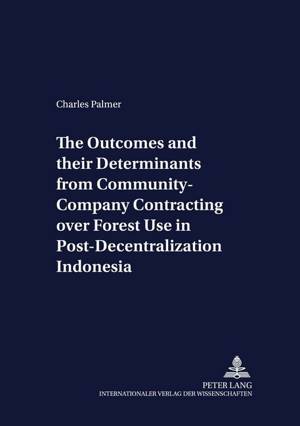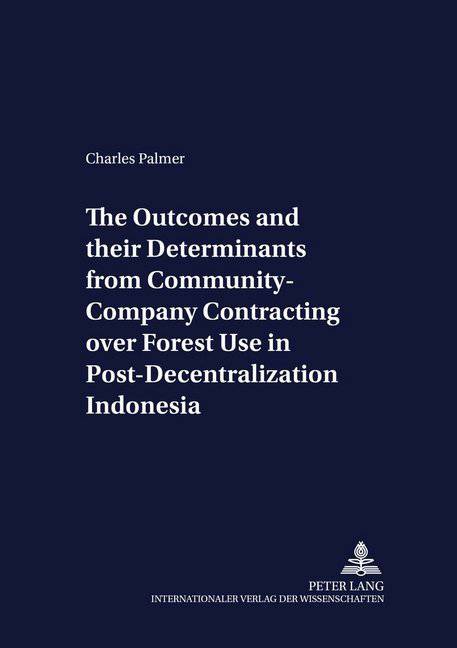
- Afhalen na 1 uur in een winkel met voorraad
- Gratis thuislevering in België vanaf € 30
- Ruim aanbod met 7 miljoen producten
- Afhalen na 1 uur in een winkel met voorraad
- Gratis thuislevering in België vanaf € 30
- Ruim aanbod met 7 miljoen producten
Zoeken
The Outcomes and Their Determinants from Community-Company Contracting Over Forest Use in Post-Decentralization Indonesia
Dissertationsschrift
Charles Palmer
€ 75,95
+ 151 punten
Omschrijving
Decentralization in Indonesia allowed forest-dependent communities to legally trade in their customary forest rights for a share in timber rents. Despite uncertain property rights, communities engaged in negotiations with firms for logging agreements. The benefits that flowed to communities from these agreements varied significantly. Research was undertaken, first, to compare the impacts of mechanized logging on communities before and after decentralization. The second aim was to analyze the potential factors underlying the variation in post-decentralization outcomes. A conceptual framework and a game-theoretic model of community-firm interactions are developed, which allow for the derivation of hypotheses on determining factors and the expected directions of effects. To test these empirically, fieldwork was undertaken in East Kalimantan. The results showed that communities benefited financially and perceived no significant differences in some logging impacts after decentralization compared to before. Post-decentralization community-firm conflict, inter-community conflict and intra-community conflict were all common occurrences. Nevertheless, there is no evidence of a trade-off between environmental and financial contractual provisions. Given weak property rights, the community's ability to self-enforce its rights over the forest are shown to be crucial for claiming a significant share of logging rent. The theoretical hypotheses are generally supported by econometric analysis using survey data.
Specificaties
Betrokkenen
- Auteur(s):
- Uitgeverij:
Inhoud
- Aantal bladzijden:
- 189
- Taal:
- Engels
- Reeks:
- Reeksnummer:
- nr. 52
Eigenschappen
- Productcode (EAN):
- 9783631551967
- Verschijningsdatum:
- 23/05/2006
- Uitvoering:
- Paperback
- Formaat:
- Trade paperback (VS)
- Afmetingen:
- 148 mm x 210 mm
- Gewicht:
- 289 g

Alleen bij Standaard Boekhandel
+ 151 punten op je klantenkaart van Standaard Boekhandel
Beoordelingen
We publiceren alleen reviews die voldoen aan de voorwaarden voor reviews. Bekijk onze voorwaarden voor reviews.







